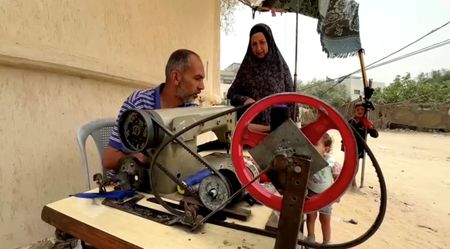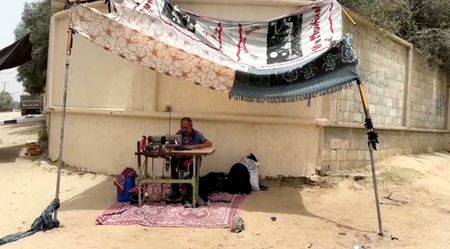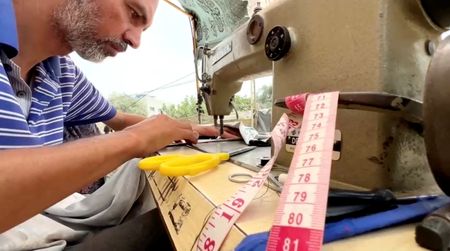By Mohammad Salem
RAFAH, Gaza (Reuters) - Palestinian tailor Anwar Abu Keresh used to take out the clothes of his Gaza customers but after eight months of Israel's military campaign and the hunger crisis it has caused, he now has to tighten them to fit people's thinning bodies.
The U.N. says over a million people face "catastrophic" levels of hunger in Gaza and has said there is famine in parts of the enclave. Aid supplies into the territory have plummeted since Israel began military operations in Rafah this month.
"We are now tightening clothes to small sizes due to the lack of food, the lack of water, and there is nothing for people to eat. People are living on canned food," said Abu Keresh in a video obtained by Reuters.
"No one should tighten their clothes. People's clothes would have remained the same," he added.
Abu Keresh was sewing as a mother and her children stood nearby waiting for him to finish taking in their clothes.
"I was above 90kg. I used to loosen my clothes but now I have to tighten my clothes," said the woman, who identified herself as Um Alaa Abu Sameha.
"It is not just us that lost weight, even my granddaughter got affected by the war, she lost weight. I brought her clothes, I'm getting her shorts tightened for her to be able to wear them," she said.
In Deir al-Balah in central Gaza people showed photographs from before the war to compare how they looked after months of war - with nearly all people displaced from their homes - to their healthier selves before October.
Um Arshad al-Sursok showed a picture of her five-year-old son Mohammed.
"Now as you can see he has lost a lot of weight. He only has two sets of clothes left," she said. "I exchange this for that and when I see that they are becoming loose I have to take them to the tailor to tighten them," she said.
KHAN YOUNIS
The Israeli assault on Rafah comes as part of a wider military campaign triggered by the Hamas attack on Israel on Oct. 7.
The city, on the border with Egypt, had been the last place in Gaza not entered in force by Israeli troops and more than a million people had taken shelter there after being forced from their homes by the war.
Most of them have now fled, many to the beach area of al-Mawasi outside Rafah where they live in tents or shacks, others to the ruins of their former homes.
In Khan Younis, not far from Rafah, Ikram al-Ham was sheltering in a tent in the rubble with her family. Clothes hung from the smashed remains of a roof.
"This house has many memories. I gave birth to five children in it. I brought them up with my heart and my blood," she said, describing its destroyed remains as having become "a cave of fear".
"I look at other people's homes and the rubble and I think 'when will Palestine return, or even Gaza'," she said.
She picked through the rubble, inspecting the family's broken old fridge that once contained food for children who now go hungry.
At night, with no electric light, the ruins are frightening
"I always used to find the children playing here and they used to be happy. Now I don't see anyone happy," she said.
(Reporting by Mohammad Salem in Rafah; Writing by Angus McDowall; Editing by Alison Williams)









